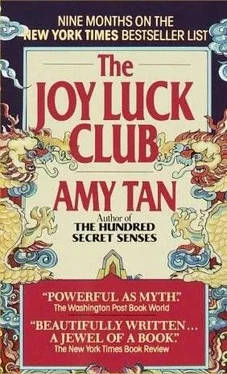"How can you say she is not coming in a letter?" said Auntie Lindo. "She is their mother. She is your mother. You must be the one to tell them. All these years, they have been dreaming of her." And I thought she was right.
But then I started dreaming, too, of my mother and my sisters and how it would be if I arrived in Shanghai. All these years, while they waited to be found, I had lived with my mother and then had lost her. I imagined seeing my sisters at the airport. They would be standing on their tiptoes, looking anxiously, scanning from one dark head to another as we got off the plane. And I would recognize them instantly, their faces with the identical worried look.
" Jyejye, Jyejye . Sister, Sister. We are here," I saw myself saying in my poor version of Chinese.
"Where is Mama?" they would say, and look around, still smiling, two flushed and eager faces. "Is she hiding?" And this would have been like my mother, to stand behind just a bit, to tease a little and make people's patience pull a little on their hearts. I would shake my head and tell my sisters she was not hiding.
"Oh, that must be Mama, no?" one of my sisters would whisper excitedly, pointing to another small woman completely engulfed in a tower of presents. And that, too, would have been like my mother, to bring mountains of gifts, food, and toys for children-all bought on sale-shunning thanks, saying the gifts were nothing, and later turning the labels over to show my sisters, "Calvin Klein, 100% wool."
I imagined myself starting to say, "Sisters, I am sorry, I have come alone…" and before I could tell them-they could see it in my face-they were wailing, pulling their hair, their lips twisted in pain, as they ran away from me. And then I saw myself getting back on the plane and coming home.
After I had dreamed this scene many times-watching their despair turn from horror into anger-I begged Auntie Lindo to write another letter. And at first she refused.
"How can I say she is dead? I cannot write this," said Auntie Lindo with a stubborn look.
"But it's cruel to have them believe she's coming on the plane," I said. "When they see it's just me, they'll hate me."
"Hate you? Cannot be." She was scowling. "You are their own sister, their only family."
"You don't understand," I protested.
"What I don't understand?" she said.
And I whispered, "They'll think I'm responsible, that she died because I didn't appreciate her."
And Auntie Lindo looked satisfied and sad at the same time, as if this were true and I had finally realized it. She sat down for an hour, and when she stood up she handed me a two-page letter. She had tears in her eyes. I realized that the very thing I had feared, she had done. So even if she had written the news of my mother's death in English, I wouldn't have had the heart to read it.
"Thank you," I whispered.
The landscape has become gray, filled with low flat cement buildings, old factories, and then tracks and more tracks filled with trains like ours passing by in the opposite direction. I see platforms crowded with people wearing drab Western clothes, with spots of bright colors: little children wearing pink and yellow, red and peach. And there are soldiers in olive green and red, and old ladies in gray tops and pants that stop mid-calf. We are in Guangzhou.
Before the train even comes to a stop, people are bringing down their belongings from above their seats. For a moment there is a dangerous shower of heavy suitcases laden with gifts to relatives, half-broken boxes wrapped in miles of string to keep the contents from spilling out, plastic bags filled with yarn and vegetables and packages of dried mushrooms, and camera cases. And then we are caught in a stream of people rushing, shoving, pushing us along, until we find ourselves in one of a dozen lines waiting to go through customs. I feel as if I were getting on the number 30 Stockton bus in San Francisco. I am in China, I remind myself. And somehow the crowds don't bother me. It feels right. I start pushing too.
I take out the declaration forms and my passport. "Woo," it says at the top, and below that, "June May," who was born in " California, U.S.A.," in 1951. I wonder if the customs people will question whether I'm the same person as in the passport photo. In this picture, my chin-length hair is swept back and artfully styled. I am wearing false eyelashes, eye shadow, and lip liner. My cheeks are hollowed out by bronze blusher. But I had not expected the heat in October. And now my hair hangs limp with the humidity. I wear no makeup; in Hong Kong my mascara had melted into dark circles and everything else had felt like layers of grease. So today my face is plain, unadorned except for a thin mist of shiny sweat on my forehead and nose.
Even without makeup, I could never pass for true Chinese. I stand five-foot-six, and my head pokes above the crowd so that I am eye level only with other tourists. My mother once told me my height came from my grandfather, who was a northerner, and may have even had some Mongol blood. "This is what your grandmother once told me," explained my mother. "But now it is too late to ask her. They are all dead, your grandparents, your uncles, and their wives and children, all killed in the war, when a bomb fell on our house. So many generations in one instant."
She had said this so matter-of-factly that I thought she had long since gotten over any grief she had. And then I wondered how she knew they were all dead.
"Maybe they left the house before the bomb fell," I suggested.
"No," said my mother. "Our whole family is gone. It is just you and I."
"But how do you know? Some of them could have escaped."
"Cannot be," said my mother, this time almost angrily. And then her frown was washed over by a puzzled blank look, and she began to talk as if she were trying to remember where she had misplaced something. "I went back to that house. I kept looking up to where the house used to be. And it wasn't a house, just the sky. And below, underneath my feet, were four stories of burnt bricks and wood, all the life of our house. Then off to the side I saw things blown into the yard, nothing valuable. There was a bed someone used to sleep in, really just a metal frame twisted up at one corner. And a book, I don't know what kind, because every page had turned black. And I saw a teacup which was unbroken but filled with ashes. And then I found my doll, with her hands and legs broken, her hair burned off…When I was a little girl, I had cried for that doll, seeing it all alone in the store window, and my mother had bought it for me. It was an American doll with yellow hair. It could turn its legs and arms. The eyes moved up and down. And when I married and left my family home, I gave the doll to my youngest niece, because she was like me. She cried if that doll was not with her always. Do you see? If she was in the house with that doll, her parents were there, and so everybody was there, waiting together, because that's how our family was."
The woman in the customs booth stares at my documents, then glances at me briefly, and with two quick movements stamps everything and sternly nods me along. And soon my father and I find ourselves in a large area filled with thousands of people and suitcases. I feel lost and my father looks helpless.
"Excuse me," I say to a man who looks like an American. "Can you tell me where I can get a taxi?" He mumbles something that sounds Swedish or Dutch.
"Syau Yen! Syau Yen!" I hear a piercing voice shout from behind me. An old woman in a yellow knit beret is holding up a pink plastic bag filled with wrapped trinkets. I guess she is trying to sell us something. But my father is staring down at this tiny sparrow of a woman, squinting into her eyes. And then his eyes widen, his face opens up and he smiles like a pleased little boy.
Читать дальше












